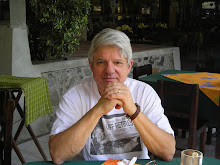But don't count on jobs in the renewable energy sector, as those jobs will be among the first to disappear.
Also, the authors do not focus on the reality of a final power blackout and a fast collapse at some point. Richard Heinberg appears to forecast this collapse between now and 2030. I guesstimate the collapse will occur before 2020. After this, things will get "challenging."
We are facing the collapse of the highways that depend on diesel trucks for maintenance of bridges, cleaning culverts to avoid road washouts, snow plowing, roadbed and surface repair. When the highways fail, so will the power grid, as highways carry the parts, transformers, steel for pylons, and high tension cables, all from far away. With the highways out, there will be no food coming in from "outside," and without the power grid virtually nothing works, including home heating, irrigation, water and waste water treatment, pumping of gasoline and diesel, airports, communications, and automated systems.
In June I took a trip to
He has solar powered just about everything, including a solar powered canoe which we went for long ride in on a lake in the Adirondacks, and a PV solar powered house and pump for his well. He repairs about everything on his house himself and he heats much with passive solar. So the guy knows his stuff. He is no ivory tower academic.
We talked for hours about survival in the northeast after the last power blackout.
It looks "challenging."
Eventually batteries and even the solar panels deteriorate. He thinks that he could store dry batteries with the liquid stored in glass and thus make "new batteries" after they conk out. But eventually the batteries and solar panels give out.
Cutting and moving wood without trucks, horses, and wagons will be a major effort and very time consuming. There are not many horses around and it will take decades to breed enough horses to go around. Horses require food, care, vets, and medicine. No one is making wagons these days locally.
Wood stoves break, just like everything else. You could keep one or 2 extras, but eventually you have none and can't get more, because there is no transportation on the highways.
Asphalt roof shingles need to be replaced, and houses need to be painted and maintained.
Food must be grown in with a short growing season, and all of the farm stuff that used to be in a 1890 Sears catalog is no longer available. Last summer I took a tour of a farm and saw how dependent farming is on oil -- transportation and manufacture of plastic feeding bowls, containers to store grains/feeds, straw, roofs for animals and storage areas, wire, rope, wood boards, cement, fencing, antibiotics for animals, asphalt shingles etc. Seed and hardware used to be available at the local hardware store, no more.
Then there is clothing which is manufactured and transported from afar. Making cloth is a major operation from growing cotton to making cloth. I have studied the textile mills of
Potable water is another problem, and sanitation also.
And there will be no modern pharmacies or hospitals.
After auto and air transport end (which could be next week if there is some "untoward activity" in the
Wasn't it that guy Murphy who said that if something can go wrong it will.
When the music stops (that is when air and automobile transportation ends) where you are is important, because that is pretty much where you will stay.




No comments:
Post a Comment